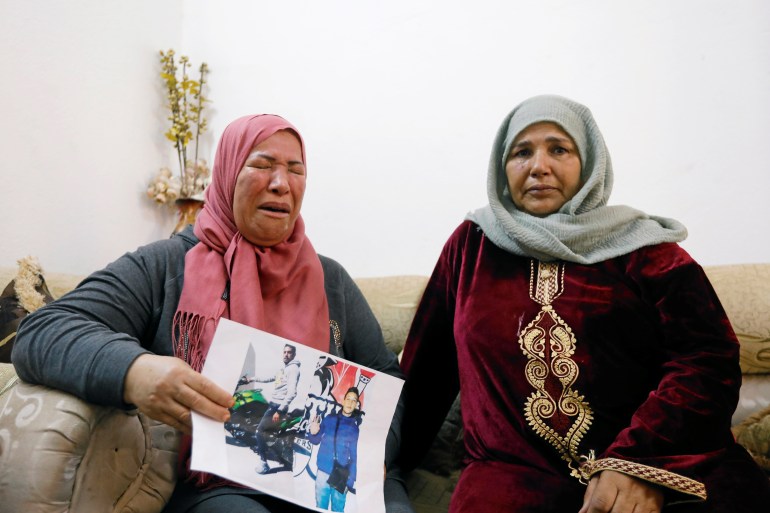Many Tunisian families are taking the risk of sailing in an attempt to reach the shores of Europe in light of the economic and social crises Tunisia is going through.
In her house in a popular neighborhood in the coastal city of Sfax (southern Tunisia), Mabrouka and her children sit on the floor in a room where they share food barely enough for two people, and she says, "We have no solution, either we all die or we succeed in arriving" to Europe, after two failed attempts to leave the country by sea .
Mabrouka, 38, who wears faded clothes in her house, whose walls are eroded and has no water or electricity, adds that she will try again to migrate by sea in order to treat her son.
Her husband, Raouf Hawij, tried twice in July and August to cross the sea illegally with all members of the family after his situation became narrow and he no longer makes enough money from collecting plastic and scrap pieces - from which he was subsisting - enough money to treat his eldest son Ahmed The 22-year-old has been disabled since suffering severe brain haemorrhage from an accident 5 years ago.
Raouf was arrested on his second attempt, and Mabrouka remained alone, facing a difficult situation with her five children.
"I did not commit a sin, I did not commit a sin, I did not steal and did not commit a crime," the woman says, with tears. "I just stole the sea and tried." She added, "I despair of life and my condition has become more and more troubled.
A Tunisian woman from Sfax governorate holds a picture of her son, who rode the sea towards Europe (Reuters)
No help.
In a video that the family filmed by phone during their attempt to cross the sea last July, Father Raouf appears screaming at the Coast Guard forces who surrounded him and forced him to return to the port, "Do not blame me for accompanying my children, no one turned to me and no one helped me." .
And on the deck of the boat, his wife Mabrouka sat and all the family members surrounded the son, who was extended seat and a respirator tightened to his nose.
The mother, who is illiterate, says that she sought help from officials, but no one answered her. They only gave her 180 dinars (55 euros) for the bandages, and she is constantly afraid that Ahmed will die every moment.
Raouf and Mabrouka made their decision after successful attempts by families in their region who managed to reach Italy. Mabrouka says that these families "are in good condition, and there are those who called us and said, Come to Italy, we can treat your children."
"I don't know the sea, and I was afraid," says her daughter Aya, 12, and points out that the family's home is about 10 kilometers from the beach.
Family choice
As for Maryam, Mabrouka's sister, whose husband and son drowned while trying to cross the sea, she said, "My sister and her husband are right, and if I were in her place I would have done the same."
Maryam sends her children to pick up snails and cook them for breakfast when she and her sister do not find money to buy food. "Whatever it is, living in Italy is always much better than Tunisia," she says with a curse and bitterness.
And a researcher in sociology, Fouad Ghorbali, considers that there is a shift to family migration, and he believes that this is a new and interesting fact.
Ghorbali says that immigration has become a family option, an attempt to win the sympathy of the groups against the deportation of irregular migrants from Europe.
He adds that "children for families who ride the sea are a lifeline for not being deported from Europe," indicating that there is a state of collective frustration caused primarily by the living situation.
Also, the immigration policies followed by European countries are inflexible, as obtaining a visa is not an easy matter, according to the Tunisian researcher.
Migrants by the thousands, and
since the beginning of the year until mid-September this year, 8,020 people tried to immigrate illegally from Tunisia, and among them there are about 250 minors, according to the statistics of the Tunisian Ministry of the Interior.
The Tunisian Forum for Economic and Social Rights, a non-governmental organization specializing in the issue of illegal immigration, stated that the number of arrivals to the Italian coasts since the beginning of this year has exceeded 22 thousand, registering an unprecedented number since 2011, with the beginning of the increase in the number of minors among immigrants.
The official in charge of media at the forum, Ramadan Bin Omar, says that the organization estimates about 8 thousand the number of illegal immigrants who arrived on the Italian coast during the first 8 months of this year, and that between 90 and 100 Tunisian families arrived on the Italian coasts.
Ben Omar explains that the Tunisian family was previously a "resistance element" to the migration of its children, but it became frustrated and burdened with the difficult economic and social situation, and it did not see any objection to financing the migration project for its children, and it began to participate in the migration process.
Since the 2011 revolution, Tunisia has been experiencing a democratic transition that has faced many difficulties, including the unemployment file, which stands at 30% in some marginalized areas.

